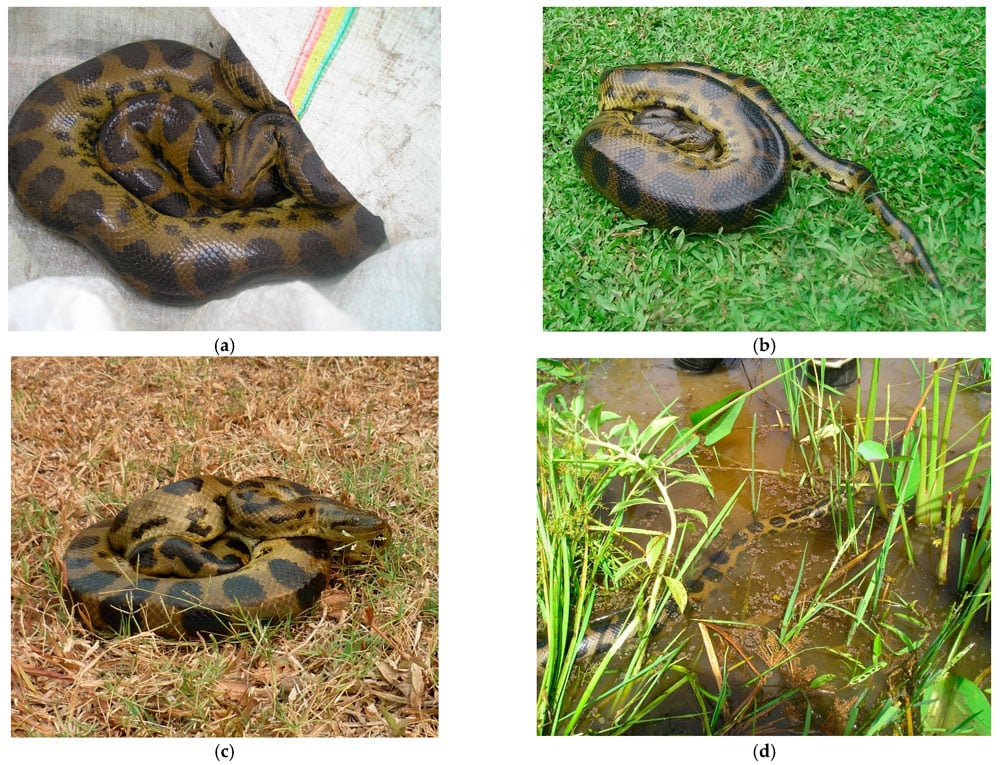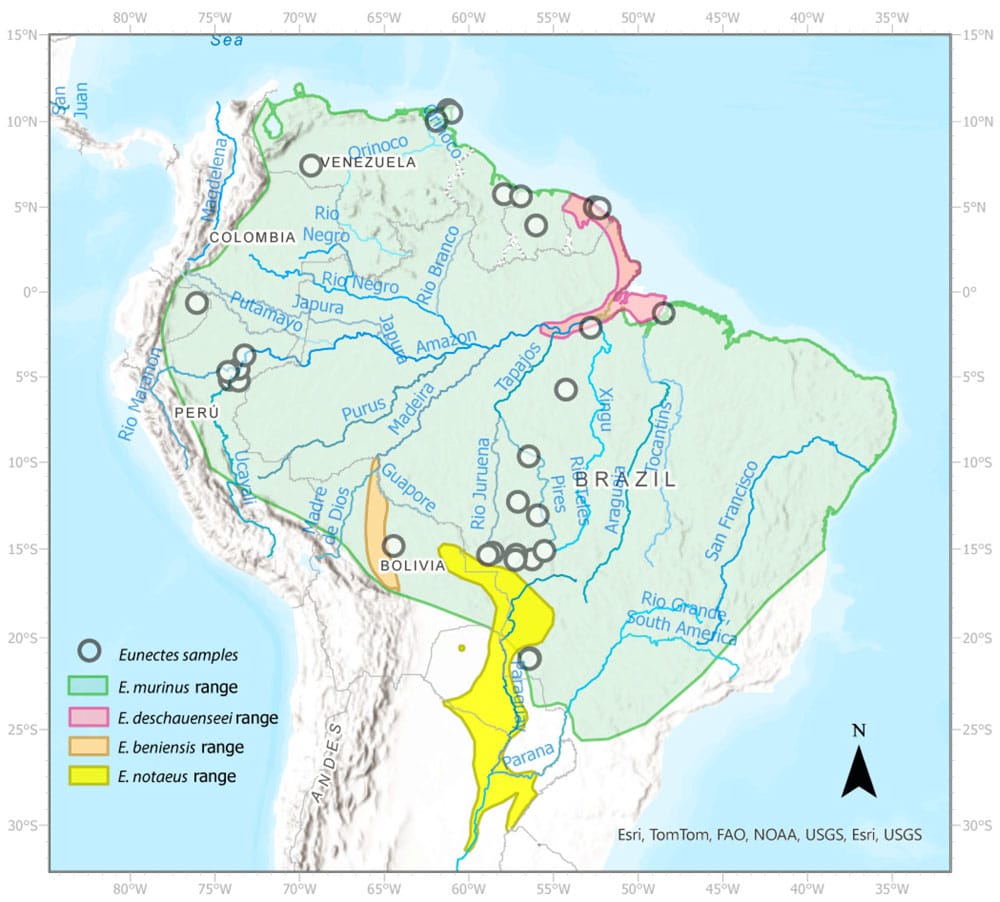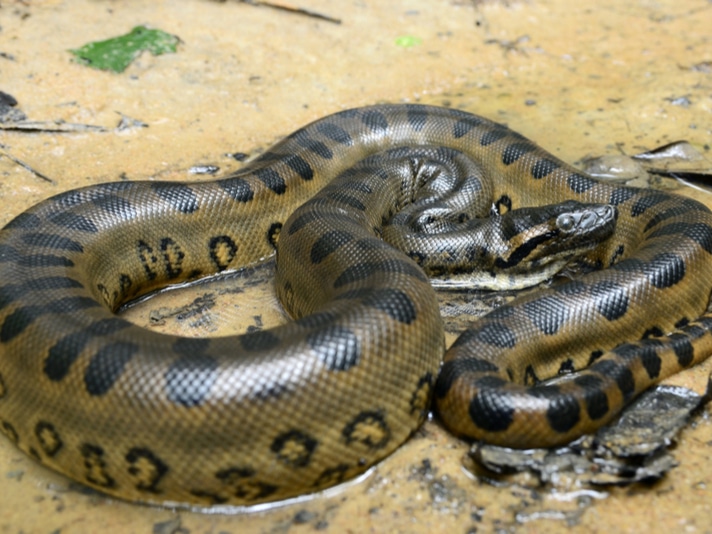Based on genetic data from four recognized anaconda species, the Northern green anaconda is a separate species from the Southern green anaconda.
Researchers have determined that based on genetic data from four recognized anaconda species, the Northern green anaconda (Eunectes akayima sp. nov) is a separate species from the Southern green anaconda (E. murinus). They also propose, using genetic and phylogeographic analyses, unifying Eunectes deschauenseei and Eunectes beniensis with Eunectes notaeus, to create a single species.
The newly described species, the Northern green anaconda (Eunectes akayima sp. nov) is known to exist in Ecuador, Colombia, Venezuela, Trinidad, Guyana, Suriname and French Guiana. The dark spotted anaconda (Eunectes deschauenseei) has a wider range, from the Amazon River delta in Brazil to French Guiana.

(a) E. deschauenseei caught in Beni, Bolivia (B54). (b,c) Anacondas caught in Beni that had markings of E. deschauenseei but were recovered as E. beniensis in the phylogenetic analysis (B52 and B58). (d) E. beniensis recovered as E. beniensis in the phylogenetic analysis. Photo by (a) E. deschauenseei caught in Beni, Bolivia (B54). (b,c) Anacondas caught in Beni that had markings of E. deschauenseei but were recovered as E. beniensis in the phylogenetic analysis (B52 and B58). (d) E. beniensis recovered as E. beniensis in the phylogenetic analysis. Photo by (a) E. deschauenseei caught in Beni, Bolivia (B54). (b,c) Anacondas caught in Beni that had markings of E. deschauenseei but were recovered as E. beniensis in the phylogenetic analysis (B52 and B58). (d) E. beniensis recovered as E. beniensis in the phylogenetic analysis. Photo by Jesus A. Rivas et.al.
The researchers also note that it could be found Suriname as well. The yellow anaconda (Eunectes notaeus) can be found in the Pantanal, Chaco as well as in Brazil, Bolivia, Paraguay, Argentina and Uruguay. The green anaconda (E. murinus) is found in much of South America as well as Trinidad Island in the Caribbean. The researchers note in their paper that there is a strong overlap between E. deschauenseei and E. beniensis and that of E. murinus.
The research was conducted over two decades with significant strides made in on a 2022 expedition in the Ecuadorian Amazon. The trip was made via an invitation from Warrant leader Penti Baihuam who leads the Baihuaeri Warrant territory in Ecuador’s Bambino region. Actor Will Smith was also in the expedition as part of a National Geographic series he is filming. The researchers collected data, including tissue and blood samples from each specimen as well as habitat type and location. That data proved that the green anaconda is actually two distinct species. The two species look almost identical but have a 5.5% divergence in genetics.

Sampling location of samples used in this study. The green area is the known distribution of the Green Anaconda (Eunectes murinus). The yellow area is the distribution of the Yellow Anaconda (E. notaeus). The orange area is the reported distribution of E. beniensis and the red area is the distribution of E. deschauenseei. Map via USGS
In addition to describing the new species, the researchers in their paper write a phylogeographic hypothesis that looks at the change in anaconda divesifcation in western South America during the Miocene.
The complete paper, “Disentangling the Anacondas: Revealing a New Green Species and Rethinking Yellows” can be read on the open access journal Diversity.
Green Anaconda Information
Anacondas are non-venomous constrictors that are among the largest snake species in the world, reaching lengths of more than 17 feet and weights that can exceed 150lbs. One notable trait with these snakes are their eyes are set on top of their head, which enables them to see above the water with just their head exposed.
Golden Dorado Follows Green Anaconda In Potential Nuclear-Follower Feeding Association
This snake is probably the most widely mythologized of the large constrictors due in part to old television shows and movies that depicted them as massive, monstrous reptiles that devour anything that moves. They have been reported to be, erroneously, the largest snakes in the world. They aren’t. In the Americas, they are, unless you count the invasive Burmese pythons of the Florida Everglades.



